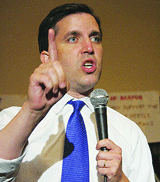Harlem panel gets four Democrats on the record on priorities on epidemic
The four Democrats who want to be New York City’s next mayor answered questions about AIDS policies to a packed audience in Harlem last week.
The event was nearly taken over by activists who threatened to shout out questions not included on the list pre-arranged by event organizers, if the forum were not opened up to queries from the audience.
The format of the event, held at the National Black Theater of Harlem, had been agreed to by the Democratic candidates. Ten questions were set out in a checklist, and each candidate, appearing sequentially rather than as a group, were to be asked questions by individuals chosen ahead of time.
Unhappy with this format and fearing that issues outside the purview of the pre-determined list would be ignored, Tokes Osubu, the executive director of Gay Men of African Descent (GMAD), informed one of the evening’s lead organizers from the New York AIDS Coalition (NYAC) that his group would join others and shout out their questions if they were not given an opportunity to raise issues in a more organized manner.
Joey Pressley, NYAC’s executive director and the evening’s moderator, promptly complied with Osubu’s request, making an announcement—in the middle of formal remarks by Fernando Ferrer, the former Bronx borough president widely viewed as the Democratic front-runner—that audience members could come forward with concise questions for the candidates. Ferrer, though clearly caught off stride, did not object.
When Osubu got up to the microphone, he admonished Ferrer for failing to specifically talk about gay men in his remarks, insisting that the candidate pledge to talk about gays as the primary approaches. Ferrer reacted slowly, but in the end argued that he has already been doing so throughout his campaign.
Ferrer pledged to direct a written inquiry to the health commissioner about the problems of access to city STD clinics first reported in Gay City News last month. The candidate reached into his pocket in answer to a question on the topic, handing this reporter a letter he kept there that he said would serve as the model for his inquiry to the health department. As of press time, however, Ferrer’s campaign has been unable to confirm that he has followed through.
The evening in large measure reflected a broad consensus among the four candidates in affirming the ten goals spelled out in the original outline for the evening.
City Council Speaker Gifford Miller, who represents Manhattan’s East Side, had the most to say about policy, arguing that he had ready experience to bring from one side of City Hall to the other.
Anthony Weiner, a congressman who represents portions of Brooklyn and Queens, focused primarily on innovations he would make and his commitment to ending waste.
C. Virginia Fields, the Manhattan borough president who earlier represented Harlem on the City Council, spoke about the need to bring people together, though her remarks were considerably more low-key than those of the other candidates.
Ferrer invoked his borough presidency in the Bronx, where the highest city’s highest STD rates are found, in burnishing his credentials to lead on the fight against AIDS.
No one among the four candidates disagreed on the need for students to be educated in the public schools about condom use and STDs.
Repeatedly citing failures of the former Giuliani administration on HIV/AIDS, the Democrats had a tougher time making a strong case against incumbent Mayor Michael Bloomberg. Miller made the gamest attempt, with a sound bite he emphasized by counting on his fingers when he said that looking back the mayor would be known only for “one, cigarettes, and two, the stadium.” The audience loved that one.
The candidates all promised to end an accounting trick devised during the Giuliani years in which funds from the federal Housing Opportunities for People with AIDS were to cover staff expenses rather than provide permanent shelter, a maneuver decried as the HOPWA swap. Each of the Democrats emphasized the need for improving housing conditions for people living with AIDS.
The candidates also promised to improve all the facilities managed by the city’s HIV/AIDS Services Administration to the standards set by the “flagship” location in Manhattan.
City syringe exchange programs were endorsed by the group as an essential tool in stemming infection, and each of the candidates pledged to do more to educate the police about the rights of those carrying clean needles.
The organizers, six groups on a steering committee led by NYAC, expressed satisfaction that they had gotten each of the Democrats on the record in support of their ten key issues, which they said are critical to fighting the HIV/AIDS epidemic.
By the time Weiner got up to speak, much of the crowd had drifted out, something that might have been avoided had the Democrats agreed to appear as a group.
In response to a question from Body Positive’s Eric Rodriguez, Weiner spoke convincingly about the way in which community-based organizations are as important to the AIDS fight as small businesses are to the health of the economy.
Mayor Michael Bloomberg was invited to join the forum, but is unlikely to appear at such events until the Democrats settle on a candidate for the fall election. NYAC has not yet announced plans for such a match-up on AIDS, but said it is considering its options.
gaycitynews.com


































